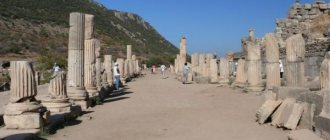Bible Interpretation, 1 Corinthians 1
Old Testament
New Testament
1 Corinthians
Books of the Bible:
- Gospel of Matthew
- Gospel of Mark
- Gospel of Luke
- Gospel of John
- Acts of the Apostles
- Epistle of James
- 1 Peter
- 2 Peter
- 1 John
- 2 John
- 3 John
- Epistle of Jude
- Romans
- 1 Corinthians
- 2 Corinthians
- Epistle to the Galatians
- Epistle to the Ephesians
- Epistle to the Philippians
- Epistle to the Colossians
- 1 Thessalonians
- 2 Thessalonians
- 1 Timothy
- 2 Timothy
- Epistle to Titus
- Epistle to Philemon
- Hebrews
- Revelation of John
Chapter 1
Introduction
1
I. Introduction (1:1-9)
In the introductions to his letters, Paul often sets the stage for subsequent conversation on certain topics, and 1 Corinthians is no exception in this regard. In 1:1, he briefly outlines the main themes of the letter - his calling to be an apostle, the calling of the Corinthian Christians to be saints, and the unity of all believers who call on the name of Christ.
A. Greeting and Introduction of the Author and His Readers (1:1-3)
1 Cor. 1:1
. In this letter, Paul speaks as if in hints about the truth of his apostleship, about the legal nature of it, although some disputed it (chapter 9), however, he states this completely unambiguously in 2 Corinthians. But already in the first verse of 1 Corinthians, he claims that his position among believers is determined not by himself, but by the will of God, and that in the Church he represents not his own interests, but the interests of Jesus Christ.
Sosthenes was probably one of the people close to Paul; perhaps this is the same ruler of the synagogue mentioned in Acts. 18:17. And if this is so, then he serves as an example of how even the worst circumstances can ultimately be turned by God for the good of the believer.
1 Cor. 1:2
. The church belongs to God, not to people. If the Corinthians had realized this, then perhaps all these disagreements and contentions would not have arisen between them. Those who make up the Church are sanctified, that is, set apart by God for Himself as His property. The main point of Paul's letter is that in their daily practice the Corinthians should not stray from the position in which God had placed them. Jesus Christ must be obeyed as Lord. Those who submit to Him are united not only in Corinth, but everywhere.
1 Cor. 1:3
. Grace was what welded them together and what they needed to work together so that peace could reign between them. Grace and peace, the need for which was especially felt in the Corinthian church, are given by God to those who obey Him and trust in Him.
B. Glorifying God for the Fruits of His Mercy (1:4-9)
It seems a little strange to thank God for a church that has suffered so much trouble. If Paul had relied only on his own strength, he would hardly have succeeded in trying to change that motley group of people for the better; who made up the Corinthian church. But he knew that God was at work in this church, and this is precisely what the apostle thanked Him for.
1 Cor. 1:4
. No matter how inclined the Corinthians were to self-exaltation, they were still members of the body of Christ, being obliged to do so by God's grace and only to it.
1 Cor. 1:5
. And only because they were part of His body, they were enriched in everything, in every word and in all knowledge (i.e., they received the gifts of tongues, prophecy, discerning of spirits, etc. - 12:4-11). These gifts, however, were given to them not in order to cause “disorder” in the church, as they did, but for the benefit of all those who made up this church.
1 Cor. 1:6
. Among other things, the presence of these gifts indicates how effective the witness for Christ that the Corinthians heard from Paul was. Although he preached in weakness (2:1-5), God Himself ensured that His Word was established in their hearts.
1 Cor. 1:7-8
. Since all this was God's work, Paul does not doubt the result. The Corinthian believers were justified by God by His grace, and if so, they will appear before Him innocent (anenkletous - “not subject to blame”; compare Col. 1:22) when Christ comes to earth again. That is why they have every reason to wait for Him (the corresponding Greek word apekdehomenous means “to wait eagerly”; in relation to the return of Jesus Christ it appears seven times in the New Testament - Rom. 8:19,23,25; 1 Cor. 1 :7; Gal. 5:5; Phil. 3:20; Hebrews 9:28).
1 Cor. 1:9
. All this will be exactly so, because God is faithful, by whom you were called into the fellowship of His Son Jesus Christ our Lord. However, it is impossible for one who is in discord with other members of the body of Christ (Matt. 5:23-24) to enjoy fellowship with the Lord. With this in mind, Paul moves from what God has done in the past will not be done by Him in the future, to what the Corinthians should do at the present time, namely, to put an end to the discord and strife among themselves.
II. Divisions in the Church (1:10 - 4:21)
The first thing Paul points out is the controversy that arose in the Corinthian church.
A. The Sad Reality of Divisions (1:10-17)
1 Cor. 1:10
. The Apostle Paul addresses the Corinthians as people who are not enemies, but brothers to each other, and does this in the name of our Lord Jesus Christ, that is, relying on the highest authority in the eyes of Christians. This is already the tenth mention of the name of Jesus Christ in the first ten verses of the letter, so there is no doubt that it was the One in whom Paul believed that was to become the source and focus of the unity of the Corinthian believers. The apostle did not want the destruction of differences between them, but harmonious relationships. There is a concept of unity in diversity. That's what Paul wanted. It can be compared to a skillfully made patchwork quilt: patches of different colors and shapes merge into a harmonious whole.
1 Cor. 1:11-12
. However, the “blanket” in Corinth was torn at the seams, as was clear from the message of Chloe’s family. Since strife in the church was a sad reality, the apostle perhaps (judging by his remark in 4:6) only tentatively cited (meaning those who led the opposing groups in the Corinthian church) the names of Paul, Apollos and Cephas - so as not to aggravate the already unimportant situation.
1 Cor. 1:13
. Paul poses three rhetorical questions, each of which implies a negative answer. The universal body of Christ is not subject to division, and therefore it is unacceptable for the local church to be divided within itself. The Corinthians owe the salvation they received not to any other person, but to Christ, and they should revere only Him.
1 Cor. 1:14-17
. Paul sought to imitate Christ in every aspect of his ministry. According to the Apostle John, Jesus Himself did not baptize anyone (John 4:2), leaving it to His disciples. Paul usually did the same. Could he then believe that water baptism is necessary for salvation? Of course not (compare 1 Cor. 4:15; 9:1,22; 15:1-2). But this does not mean that water baptism is not necessary at all. It was commanded by Jesus Christ (Matt. 28:19) and was already practiced by the early Christian church (Acts 2:41).
Paul's main task was to preach the gospel (9:16) not in the wisdom of words... Brilliant eloquence can conquer the human mind, but not the heart, while simple gospel words, although they may seem foolish to people, are effective by the power of the Holy Spirit (2:4-5 ).
B. Reasons for divisions (1:18 - 4:5)
From a human perspective, the gospel message, which centers on the suffering and dying Savior of the world, may seem unreasonably contradictory. The principle according to which the one who is greatest becomes the servant of all (Matthew 23:11-12) seems to be the same to people. However, this is exactly what Paul was starting from when analyzing the causes of strife in the Corinthian church.
1. NOT UNDERSTANDING THE ESSENCE OF THE GOSPEL (1:18 - 3:4)
Essentially, the Corinthians needed a renewing of their minds (Rom. 12:2). They tried to live as Christians, based on the unsanctified “common sense” inherent in people, which is ultimately aimed at self-preservation and nothing more. Those who are guided by it and seek their own in life, strive to please themselves and, in the end, destroy themselves (Luke 9:24-25).
1 Cor. 1:18
. This is precisely what Paul wanted to convey to the Corinthians. The word about the cross strikes egocentrism to the very heart. The Apostle Paul saw in this word the main factor of salvation, which he understood as a process that begins with justification, leading to sanctification and ending with glorification. In this verse especially, but in the epistle as a whole, the apostle speaks most of all of the second stage of the process of salvation, namely, constant, progressive sanctification.
“The Word of the Cross” is a sermon about self-denial, about submission to God, which, as was the case with Christ, can lead to humiliation, suffering and even death, however, ultimately it leads not to self-destruction, but precisely to self-preservation (Mark 8:34-35), to reign with Christ (2 Tim. 2:12; Rev. 22:5). This theme, this idea that the “Word of the Cross” seems foolish only to those doomed to destruction (for those who are perishing there is foolishness), sounds in such verses as 1 Cor. 1:17-18,23-24; 2:2.8; compare Luke. 9:23-25.
1 Cor. 1:19
. As he often does, Paul supports his point with an example from the history of Israel; in this case he means what is written in Isa. 29:14 and in 2 Kings. 18:17 - 19:37: following humanly wise advice, the Israelites entered into an alliance with the Egyptian pharaoh in order to protect themselves from the Assyrian king, while only God could save them by His intervention from above.
1 Cor. 1:20-21
. And all human wisdom, no matter who speaks on its behalf - a respected Jewish scribe or a Greek sage, philosopher, finds itself in an unenviable position, because it is not able to appreciate God's plan (Is. 55: 8-9). It is not self-confident erudition, but faith, which allows a person to renounce himself, allowing him to enter the narrow path of salvation.
1 Cor. 1:22-25
. Not on human, but on God’s terms, not on their own, but on His initiative, people found what they needed: God’s power and God’s wisdom. Through the preaching of Christ crucified, God calls people to receive their spiritual sight and, looking at things with the eyes of faith, to accept the Gospel.
1 Cor. 1:26-31
If the situation were not so sad, one could almost see a skeptical smile on Paul’s face, inviting the Corinthians to look at themselves from the outside. From a human point of view, not many of the members of the Corinthian church could boast of wisdom, influence and noble birth.
And if God had chosen people for Himself based on these characteristics, then He most likely would not have chosen them. But in choosing, God, as it were, turns human standards and ideas upside down; He calls on simple people more often than on great people, so that no flesh should boast before God (verse 29), but when it does boast, it should boast only in the Lord.
Because only in Christ was the wisdom of God embodied (verse 30) and in Him the Corinthians found righteousness, that is, justification (Rom. 4:24-25), received holiness, that is, sanctification (2 Thess. 2:13-15) and salvation through atonement, and therefore glory in the future (Rom. 8:23; Eph. 4:30). According to the wisdom of God, the salvation of mankind was accomplished through the crucifixion of Christ, and this is hidden from the wise of this world, but open (i.e., understandable) to ordinary believers (compare Matt. 11:25-26).
You can learn more about God and the Bible on the website The Bible about God
Bible Online
1Paul, called by the will of God to be an Apostle of Jesus Christ, and Sosthenes brother,
2 to the church of God which is at Corinth, to those who are sanctified in Christ Jesus, called saints, with all who call on the name of our Lord Jesus Christ in every place, both among them and with us:
3 Grace and peace to you from God our Father and the Lord Jesus Christ.
4 I thank my God continually for you, because of the grace of God which was given to you in Christ Jesus,
5 For in Him you have been enriched in all things, in all speech and in all knowledge,
6 For the testimony of Christ is established in you,
7 so that you lack no gift, as you wait for the appearing of our Lord Jesus Christ,
8 Who will also establish you to the end, [so that you may be] blameless in the day of our Lord Jesus Christ.
9 God is faithful, by whom you were called into the fellowship of His Son Jesus Christ our Lord.
10 I appeal to you, brethren, in the name of our Lord Jesus Christ, that you all speak the same thing, and that there be no divisions among you, but that you be united in the same spirit and in the same thoughts.
11 For it became known to me from Chloe's household, my brothers, that there are disputes among you.
12 I understand what they say among you: “I am Paul’s”; 'I am Apollosov'; 'I am Kifin'; 'and I am Christ's'.
13 Was Christ divided? was Paul crucified for you? or were you baptized in the name of Paul?
14 I thank God that I baptized none of you except Crispus and Gaius,
15 So that no one should say that I baptized in my name.
16 I also baptized Stephen's house; I don’t know if I baptized anyone else.
17 For Christ did not send me to baptize, but to preach the gospel, not with wisdom of speech, lest the cross of Christ should be made of no effect.
18 For the message of the cross is foolishness to those who are perishing, but to us who are being saved it is the power of God.
19 For it is written: I will destroy the wisdom of the wise, and destroy the understanding of the prudent.
20 Where is the wise man? where is the scribe? where is the questioner of this century? Has not God turned the wisdom of this world into foolishness?
21 For when the world through [its] wisdom did not know God in the wisdom of God, it pleased God through the foolishness of preaching to save those who believed.
22 For both the Jews demand miracles, and the Greeks seek wisdom;
23 But we preach Christ crucified, a stumbling block to the Jews, and foolishness to the Greeks,
24 For those who are called, both Jews and Greeks, Christ, the power of God and the wisdom of God;
25 For the foolish things of God are wiser than men, and the weak things of God are stronger than men.
26 Look, brethren, who you are who are called: there are not many wise according to the flesh, not many mighty, not many noble;
27 But God has chosen the foolish things of the world to shame the wise, and God has chosen the weak things of the world to shame the strong things.
28 And God chose the base things of the world and the things that are despised, and the things that are not, to bring to nothing the things that are.
29 so that no flesh should boast before God.
30 From Him you also are in Christ Jesus, who became to us wisdom from God, righteousness, sanctification, and redemption,
31 So that it may be as it is written: He who boasts, boast in the Lord.
This letter shows that over the past period many serious problems have emerged in the Corinthian church: discord and division, misconceptions about the Lord's Supper, disorder during prayer meetings, distortion of doctrine and extremes in behavior - from depravity of morals to unhealthy asceticism. What happened? Corinth was not only one of the largest cities of the Roman Empire, but also one of the most vicious. The conveniently located shopping center offered pleasures for every taste. Against this background, Christians disagreed to the extreme: some argued that communication with sinners was permissible and necessary, while others argued the opposite. The disputes caused by these mutually exclusive opinions got out of control and threatened the future of the Corinthian community. (Geneva)1:
1-3 Paul, called by the will of God to be an Apostle of Jesus Christ, and Sosthenes, brother
Paul reports that he is not an impostor, but an apostle of Christ, without worrying that some “well-wishers” of a skeptical congregation may attribute Paul’s attempt self-exaltation above them. Anyone who is called by God to the work of service must announce this to everyone whom he himself calls to serve the Lord. It is interesting to consider to whom he writes a letter in Corinth:
The Church of God is the entire congregation of Christians in Corinth, where Paul wrote; illuminated in Christ Jesus and called saints - Christ died for them, sanctifying them with His blood before God and making them, thanks to this, suitable for God (righteous in His eyes). all who call on the name of the Lord (in this case, Christ) in every place
, both in Corinth and where Paul was at that time - these are all the other Christians.
1:
4-6 in Him
(in Christ, having received Christ)
you have been enriched in everything, in every word and in all knowledge
Paul rejoices for all to whom God, through Jesus Christ, has sent the riches of spiritual understanding of His word and the knowledge of His will. It is difficult to say exactly how God did this with the Corinthians; most likely, he instructed and called through the preaching of Paul. In addition, the Corinthians, like other pagans, were baptized with the holy spirit in the name of Jesus Christ -1:13, which made it possible for all the first meetings of Christians in the 1st century to comprehend the wisdom of God supernaturally quickly - 1 John 2:20,27
1:7,8 so that you lack no gift, as you wait for the appearing of our Lord Jesus Christ
Because of Jesus Christ's care for this congregation, they are not lacking in any spiritual gift.
This very gift of the holy spirit will help all Christians to continue to remain faithful until their very end (death), which will allow them to appear innocent before Christ on the day of the appearance of his second coming: Who will also establish you to the end, [so that you may be] innocent on the day of the Lord our Jesus Christ.
1: 9 God is faithful, by whom you were called into the fellowship of his Son Jesus Christ our Lord.
God, being faithful to His promise to accept the Gentiles, made it possible for this congregation to be in spiritual communion with Christ through the work of the holy spirit in them (1 John 1:3, 4:13). That is, in this congregation there is every opportunity to become righteous. However, how they use them is a big question.
1:
10-13 I appeal to you, brethren, in the name of our Lord Jesus Christ, that you all speak the same thing, and that there be no divisions among you, but that you be united in the same spirit and in the same thoughts.
As we see, the acquisition of spiritual gifts by the Christians of Corinth through the anointing of the holy spirit from above has not yet helped them either to become righteous or to be of one mind among themselves.
What was their contention about? Paul is not telling them about the difference in the gospel of the pattern of Christ’s teaching. And about the wrong relationships between themselves due to assigning to themselves and each other different “statuses” of significance for the Christian congregation - depending on who they were baptized by: Apollos, Peter or Paul: you say: “I am Pavlov”;
“I am Apollosov”; “I am Kifin”; “And I am Christ’s” Remnants of the habits of a worldly approach in some communities also affected their perception of Christianity: if, for example, I was baptized by the very pillar and stone of the Christian congregation - the Apostle Peter, then I, naturally, should occupy a more honorable position in the congregation in comparison with the one whom Apollos baptized, he was not even an apostle.
Sister Chloe became concerned about such divisions of “authority” and careerism in the congregation, so she reported this to Paul, which, in fact, became the reason for Paul writing a letter to this Corinthian congregation.
1:14-17
Paul explains that neither Peter, nor Apollos, nor he himself died a sacrificial death for them on the cross, and therefore it does not matter WHO baptizes, but what matters is IN WHOM NAME (for what) those who want to be Christians are baptized. The main thing in a Christian’s work is not to baptize, but to evangelize.
Baptism is a natural result of the impact of the word of the gospel, confirming only the fact of the desire of the listener - to be a Christian, to lead a righteous lifestyle and to preach the gospel after baptism. Moreover, to evangelize in such a way that the wisdom of man and the eloquence of the words of the sermon do not overshadow the main thing: an explanation of the essence of the cross (path) of Christ - for every Christian: Christ sent me not to baptize, but to evangelize, not in the wisdom of the word, so as not to abolish the cross of Christ.
Baptism itself, as a procedure, means little without the essence of fulfilling a promise to God of a good conscience.
1:18-20
Why is it important to focus not on the regalia in the meeting and not on the competition in verbal floridity and sophistication of word debates - in front of each other? Because the main power of the saving message is not manifested in the acquisition of authority and weight in the congregation, but solely in whether a Christian began to follow the path of Christ or not, whether he became better, purer, more righteous from the moment of baptism or not. And behind the verbosity, you can lose the essence of the good news about Christ crucified and still not understand why Christ died and what his atoning sacrifice means for Christians.
The reaction to the news of Christ crucified reveals who is who of the listeners: God's sheep cleave to it, and those seeking worldly glory are rejected by it: they consider the message about the meaning of the path of Christ for man to be foolishness (only an abnormal person can deliberately condemn himself to great difficulties - foolishness is This is what the whole godless world thinks) For the word about the cross is foolishness for those who are perishing, but for us who are being saved it is the power of God.
However, for the sheep of God, the idea of the sacrificial death of Christ and the desire to serve God in self-denial is very clear. That is why all the wise men of the world make fun of those who want to become Christians, but such a state of affairs, when the wise men of this age will not understand anything, and the fools will accept Christ, was predicted (Is. 29:14) Where is the wise man? where is the scribe? where is the questioner of this century? Has not God turned the wisdom of this world into foolishness?
It is difficult for sages to choose the path of self-denial, because they have something to lose in this world. And those who have nothing to lose except their “chains” of slavery to sin are not afraid to step onto the “narrow bridge” of Christ crucified, thrown across the abyss of the world - to God.
1:21
For when the world through [its] wisdom did not know God in the wisdom of God, it pleased God through the foolishness of preaching to save those who believed
. God foresaw that to the wise and successful of this age, in the conditions of “take everything you can from life,” the path of self-denial and approaching God through becoming righteous will seem stupid. God was counting on this: the foolishness of preaching about Christ crucified helps to discover believers - those who are ready to accept the atonement of Christ, change their lifestyle and be saved.
1:
22,23 For both the Jews demand miracles, and the Greeks seek wisdom; and we preach Christ crucified, for the Jews it is a temptation, and for Greeks it is madness.
Preaching Christ crucified means talking about God's Messiah - as the one who suffered the execution of a blasphemer. In this version, neither the Jews nor the pagan Greeks could accept the preaching about God's Christ. Why?
The Jews, for example, in addition to preaching about Christ, also demanded signs of the triumphal procession of the Messiah with the authority of the Messianic king (all this, in their opinion, should have accompanied the coming of the Christ of God). Where was all this with Christ? What king entered Jerusalem without a triumphal procession and without fanfare? Which king was the son of a carpenter? If he is the son of God, why did he not have the appearance or majesty of a king? They did not understand the Christ of God - in the version that Jesus presented to them, for they expected the Messiah with carnal eyes, not understanding the spiritual significance of the role of Christ, who was to redeem humanity through the crucifixion.
And the Greeks recognized human philosophies. Moreover, the Greek culture of pleasure and voluptuousness - in general, the path of self-denial and self-sacrifice - did not allow understanding.
That is why the path of Christ without a triumphal march through life, without royal authority, and, moreover, doomed to “crucifixion” by the mentality of this wicked age and associated with great difficulties - became a stumbling block for the Jews, for the Greeks - it looked like madness, as, indeed, for modern times . Everyone counts God's blessings today - in the form of the number of blessings that fall on one's head and thinks that the path of a Christian should be strewn with roses. And if they are not there, then you are not a man of God.
And few people see the essence of God’s true blessing in the image of the “crucified Christ” - in the difficulties and serious problems in this wicked world - because of the mere desire to lead a righteous lifestyle and worship the true God. It is written about this paradox that only those living in evil will prosper and prosper in this world, and the pious, from the point of view of God, will suffer greatly, for they will be persecuted by everyone (2 Tim. 3:12,13) It is this path - Christ humiliated, despised crucified by everyone, and not basking in luxury, glory and respect - and Paul wanted to preach and know. And I knew, otherwise I would not have written later that we Christians are trash for the world, trampled underfoot by everyone: they blaspheme us, we pray; We are like rubbish for the world, [like] dust, [trampled] by everyone to this day.
(1 Cor. 4:13)
Paul learned the essence of Christ crucified on his own “skin,” so to speak. He was rejected by this world, and he himself lived in poverty and persecution for the sake of fulfilling the will of God, always balancing on the brink of life and death throughout his entire Christian path. That is why Paul preached Christ crucified, so that those who want to become Christians would not hope to follow in the footsteps of Christ to God - and at the same time have a profit from piety (1 Tim. 6:5) A true Christian in this age will not receive any good except the approval of God. will receive.
1:
24,25 For those who were called themselves, Jews and Greeks, Christ, the power of God and the wisdom of God;
Believers see in this sermon about Christ crucified the power of God and His wisdom.
Why such a difference in the perception of the same message? because the foolish things of God are wiser than men, and the weak things of God are stronger than men.
Because the wise men of this age, from the point of view of God, are in fact fools, for they rely on their personal and very limited knowledge, they are not interested in becoming a righteous person worthy of eternity in the Creator’s universe, they are pursuing the temporal glory of this age.
Those who are more interested in the inner essence, and not the outer gloss, who live in hope for the future and believe in the possibility of finding God through the acceptance of Christ are wise, for they desire the salvation and glory of the man of God, and acquire knowledge from God, realizing that their own knowledge they will not be made righteous.
1:26-29
Look, brothers, who you are called.
not find his disciples in the Sanhedrin, neither the nobles nor the Pharisees with the high priests walked as his disciples;
and large businessmen and merchants were also not to be found among them. So in Corinth: few of the congregation possessed the carnal practicality of this age and worldly opportunism. Those who have successfully settled into this world and are thriving on the laurels of this century are not interested in the path of Christ in principle. As we see, the possibility of salvation does not depend either on a person’s worldly merits or on his position in society. But it depends only on spirituality - on the inner worldview of those living on earth, who want or do not want to lead a God-pleasing lifestyle. As a rule, the higher the worldly and carnal status in a person, the less chance he has of approaching God: God chose the base things of the world and the base things and the things that are not, in order to abolish the things that are.
Why did Paul say this if we go back to the beginning of his letter and the problem in the Corinthian congregation? So that they understand: those members of the Corinthian Christian congregation who could be considered influential people according to the usual worldly approach could not claim election and privileges in the congregation due to some of their personal qualities or the fact that they were baptized by Christian “authorities.” " What matters to God is only inner humility and lack of ambition. Therefore, discord in Christian congregations due to differences in the status of fellow believers is unacceptable.
so that no flesh should boast before God. This principle excludes human merit as a criterion for election and calling by God. It is the basis of the Biblical teaching about the possibility of salvation for every believer, regardless of weight and position in society. Salvation does not come from merit in the society of this age, but as a gift from God to those who fear Him and want to live in His world.
1:
30,31 From him you also are in Christ Jesus, who became for us wisdom from God, righteousness and sanctification and redemption.
All for whom the way of Christ and Christ himself became the meaning of life, who accepted his redemption and were sanctified by it, have the opportunity from now on, it is not to boast about personal merits or position in society, but about the fact that God called them to serve and recognized them as righteous:
he who boasts, boast in the Lord.
A Christian has the opportunity to boast about his spiritual successes achieved thanks to the Lord, for example: the strength of faith, Christian internal qualities, resistance to temptation, the ability to evangelize and win disciples for Christ, increasing the congregations of God.









